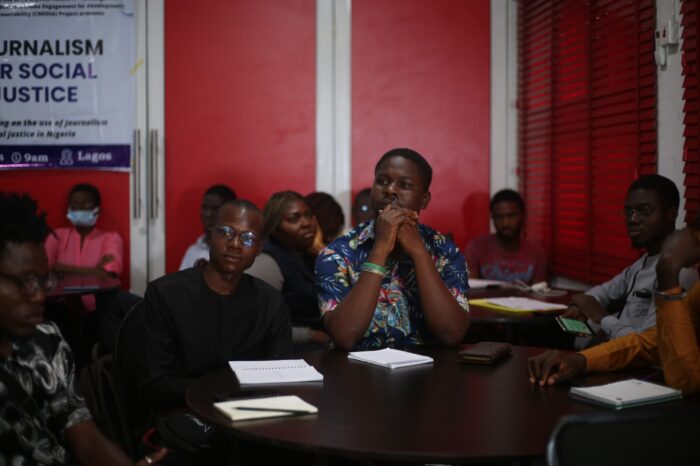In the 2024 Amnesty International report , Nigeria, Africa’s most populous country is among the third world nations with the issues of ill-treatment, unlawful attacks and killings by security forces, violation of international humanitarian law abuses by armed groups, illegal detention and awaiting trials and forced evictions.
The social justice index, also ranks Nigeria 120th out of 142 underdeveloped countries, with 70% of cases involving illegal detention and awaiting trial.
Based on the above reports, reporting of social justice issues should be one of the major focus of journalists and media organisations in the country.
However, the Founder of Foundation for Investigative Journalism (FIJ) and multiple award-winning Nigerian Investigative journalist, Fisayo Soyombo while speaking at a recent social justice workshop held on 25th July, 2024 in Lagos for twenty-two (22) early career journalists, noted that many media outlets are reluctant to cover social justice stories as they should.
Chinyere Onalu and Uzoma Okoye at the Social work Department, University of Nigeria Nsukka (UNN), defined ”Social Justice” as the fair and equitable distribution of power, resources and obligations in society to all people regardless of race, ethnicity, age, gender, ability, status, sexual orientation or religious or spiritual background.
According to them, everyone should have equal access to social, political, and economic opportunities.
Social justice journalism is reporting on daily occurrences affecting human rights, discrimination, socioeconomic, prejudice, gender inequality, and other marginalised communities through news or feature pieces with the goal of advocating for policy change.
Instead of reporting social justice issues, Soyombo said many media organisations prioritise advert revenue.

“The survival of the media is on adverts received from private companies. Because of adverts, many media companies kill stories which are against the certain private organisations.
“Some large companies in Nigeria engage in illegal trading, but they frequently place advertisements in the media. If the public files a complaint against the companies, the media will shy away from it.,” Soyombo stated.
According to him, journalism should be beneficial to people, with the potential to secure justice for all.
Using FIJ as an example, he suggested that media organisations should apply for international grants to fund social justice stories rather than relying on advertisements, which could jeopardise their impartiality and objectivity.
“There are many international organisations which can fund the media for social justice stories. Since we began publishing and recovering people’s funds, we have never demanded anything from them. We are glad to put a smile on people’s faces, which is worth more than money to us,” Soyombo said.
He said that since FIJ’s inception, it’s focus has been on publishing investigations and social justice issues which has led to the recovery of about N76 million for vulnerable people who have been duped by organisations or individuals.
The publisher revealed that a story published often brings another complaint from the public because people reach out to lodge complaints that the same issue.
He advised young journalists not to chase money in their first years in journalism but chase excellence and carve a name for themselves and impact lives through their stories.
Project Manager at FIJ, Mr. Vincent also spoke on how to measure impact and importance of social justice journalism.
He listed parameters for measuring social justice impact which includes Audience Reach & Engagement and Follow-up Actions including donations, petitions signed, volunteer sign ups.
He stated that social justice stories have impact and journalists should follow up on stories to determine whether policymakers are taking any specific action to address the issue at hand.
“To monitor policy changes, you need to ask yourself these questions: Did your story contribute to legislative proposals, policy revisions, or budget allocation related to the issue? If your story exposed injustice or wrongdoing, track any legal proceedings that may have resulted. Did your reporting contribute to the investigation?” Vincent explained.
Social justice journalism according to him, gives voice to the unheard individuals; sparks conversations and raises public awareness on critical issues; it helps to expose injustices and hold powerful actors accountable; inspires action and empower communities to fight for change.
While noting that the impact of social justice journalism goes beyond just views and clicks, he said it is about the real-world difference a story makes.
READ ALSO: Exploring other sources beyond government for investigative reports


